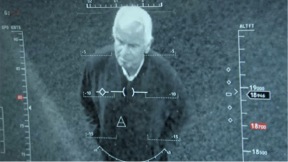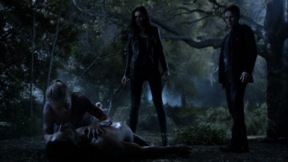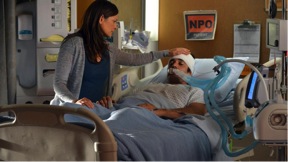Beware, this post is full of spoilers as it discusses character deaths on multiple series including 24, True Blood, Switched at Birth, Grey’s Anatomy, The Good Wife, and Arrow.
 Death is television’s ultimate trump card. It comes as the greatest shock, even when you are fairly certain it will happen, because a part of you always thinks “they’re not really going to kill off that character.” (And sometimes it is a ruse for shock value, as we saw with President Heller’s “death” in 24 this season.) But when the writers are feeling particularly bold (or want to punish an actor, according to Friends), the death sticks and it reminds you of the real world stakes. Everything becomes suddenly more serious, more dangerous, more real, because the consequences are there. While this is a great way to shake things up, the best writers make the death mean more than the in-the-moment shock.
Death is television’s ultimate trump card. It comes as the greatest shock, even when you are fairly certain it will happen, because a part of you always thinks “they’re not really going to kill off that character.” (And sometimes it is a ruse for shock value, as we saw with President Heller’s “death” in 24 this season.) But when the writers are feeling particularly bold (or want to punish an actor, according to Friends), the death sticks and it reminds you of the real world stakes. Everything becomes suddenly more serious, more dangerous, more real, because the consequences are there. While this is a great way to shake things up, the best writers make the death mean more than the in-the-moment shock.
 This season’s True Blood, for example, has seen its share of deaths. Take the season opener where Tara and Alcide are abruptly killed mid-fights. For those paying attention, Alcide’s death was perhaps not such a shock. As actor Joe Manganiello said, “I called it as soon as [Sookie and Alcide] got together [in the Season 6 finale].” Tara’s death on the other hand was only predictable in so far as Tara had sort of become extraneous. What it lacked was a real sense of transformation caused by their deaths. The shock of their death wears off, but the absence of a person or people changes dynamics and lives. That is the real opportunity. Sookie is sad about Alcide and Tara dying, but neither she nor anyone else appears to have been actually changed by these deaths. (Tara appears to be trying to send some message from wherever dead vampires go, but so far that storyline has been lackluster at best.)
This season’s True Blood, for example, has seen its share of deaths. Take the season opener where Tara and Alcide are abruptly killed mid-fights. For those paying attention, Alcide’s death was perhaps not such a shock. As actor Joe Manganiello said, “I called it as soon as [Sookie and Alcide] got together [in the Season 6 finale].” Tara’s death on the other hand was only predictable in so far as Tara had sort of become extraneous. What it lacked was a real sense of transformation caused by their deaths. The shock of their death wears off, but the absence of a person or people changes dynamics and lives. That is the real opportunity. Sookie is sad about Alcide and Tara dying, but neither she nor anyone else appears to have been actually changed by these deaths. (Tara appears to be trying to send some message from wherever dead vampires go, but so far that storyline has been lackluster at best.)
 A better example of how to use death in a television series would be in Switched at Birth. Angelo, Bay’s birth-father, and Daphne’s sort of father (it’s complicated) dies of an aneurism. The entire family must deal with the grief of this loss, but this is only a part of what happens. Daphne, who was already at odds with her mother, starts fooling around with a small-time criminal, vandalizing property, and risking her college-bound future. She shifts drastically from the general do-gooder, which is sure to create all sorts of issues down the line. Then there’s Bay, who discovers that not only did Angelo have an aneurism, but so did his sister, which means she very well might be at risk too. Plus there’s an entire side of her family that she has never met and suddenly has reason to see. For our two main characters, their lives have been turned upside-down and so much of what they do afterwards is driven by their loss.
A better example of how to use death in a television series would be in Switched at Birth. Angelo, Bay’s birth-father, and Daphne’s sort of father (it’s complicated) dies of an aneurism. The entire family must deal with the grief of this loss, but this is only a part of what happens. Daphne, who was already at odds with her mother, starts fooling around with a small-time criminal, vandalizing property, and risking her college-bound future. She shifts drastically from the general do-gooder, which is sure to create all sorts of issues down the line. Then there’s Bay, who discovers that not only did Angelo have an aneurism, but so did his sister, which means she very well might be at risk too. Plus there’s an entire side of her family that she has never met and suddenly has reason to see. For our two main characters, their lives have been turned upside-down and so much of what they do afterwards is driven by their loss.
 So, all I ask of writers is that when they choose to kill off a character, make it count. The characters can be sad, they can mourn, and they can cry. We, as viewers, should be impacted (bonus points if you can bring us to tears). There also needs to be more than just plain sorrow. There needs to be transformation, consequences, and changes. Use the death of a character to drive the story in a new or different or slightly adjusted direction. I want to see things like super-surgeon Christina Yang quitting being a doctor after she is in a plane crash that kills Lexi Grey and Mark Sloan, Alicia Florrick deciding her marriage is only worth maintaining for professional purposes after her true love Will Gardner is shot in court, and Thea Queen teaming up with her homicidal father rather than her own brother after her mother Moira Queen is stabbed by an enemy of Oliver’s. I want people to make choices, good or bad, because of the impact those deaths have and see how their lives spiral because of it. Because that is what makes those deaths ring true.
So, all I ask of writers is that when they choose to kill off a character, make it count. The characters can be sad, they can mourn, and they can cry. We, as viewers, should be impacted (bonus points if you can bring us to tears). There also needs to be more than just plain sorrow. There needs to be transformation, consequences, and changes. Use the death of a character to drive the story in a new or different or slightly adjusted direction. I want to see things like super-surgeon Christina Yang quitting being a doctor after she is in a plane crash that kills Lexi Grey and Mark Sloan, Alicia Florrick deciding her marriage is only worth maintaining for professional purposes after her true love Will Gardner is shot in court, and Thea Queen teaming up with her homicidal father rather than her own brother after her mother Moira Queen is stabbed by an enemy of Oliver’s. I want people to make choices, good or bad, because of the impact those deaths have and see how their lives spiral because of it. Because that is what makes those deaths ring true.
